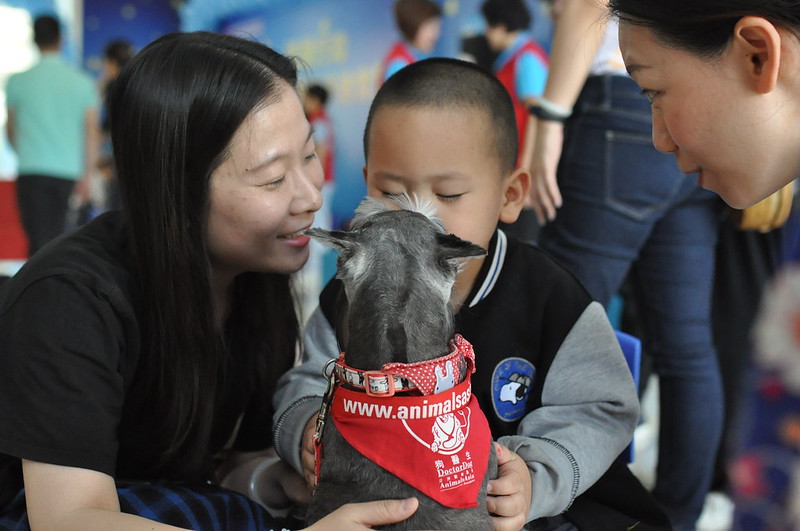As Yulin festival approaches, crowdsourced reporting of dog and cat meat illegality has saved dog lives across China
25 May 2018
Thousands of dogs in cities all over China are estimated to have been saved as public outrage over illegality puts pressure on dog meat sellers.
China’s infamous Yulin dog meat festival will once again coincide with the summer solstice on June 21. Historically, the festival was believed to see the deaths of an estimated 10,000 dogs annually, and in recent years the number was reported to have dropped significantly to an estimated 1,000 canines losing their lives. However, throughout China, an estimated 10,000,000 dogs are killed annually as part of the dog meat industry.
Yulin is just the tip of the iceberg, accounting for as little as just 0.01% of dogs slaughtered for the meat industry in China annually.
In an effort to combat the massive number of dogs lost to the meat industry throughout China, global animal welfare non-profit Animals Asia has turned its focus to combatting the larger year-round dog meat industry that sees millions of dogs killed, rather than the isolated Yulin event that lasts just a couple of days and is responsible for a fraction of that number. The organisation’s philosophy is to empower concerned Chinese citizens to act against the illegality prevalent in the dog meat industry.
Only four months after Animals Asia launched an online platform empowering the Chinese public to report suspected illegal activities by restaurants serving dog and cat meat in their communities, the impact has potentially saved thousands of lives.
-
200 dog meat restaurants in 101 cities reported to local government
-
19 restaurants closed down
-
16 given official warnings from the government
-
Thousands of dogs estimated to have been saved
Animals Asia’s Cat and Dog Welfare Director, Irene Feng said:
“Not only has the public been given a tool with which to defend their communities from the cruelty, theft and health risks associated with dog meat, the government has been given a helping hand in identifying the criminals, too. Whole communities have been empowered and animal lives have been saved.
“Now we want this to be a model for how the authorities in Yulin can deal with illegality during the summer solstice period of increased dog meat consumption. While the authorities have no power to stop the public from eating dog meat, they have a duty to apprehend those bringing illegally sourced dogs into the city without the required paperwork and health certificates, and they must also ensure all slaughter is carried out according to Chinese laws.”
Animals Asia’s online reporting service is available to users all over the country, including Yulin and surrounding areas. In the build up to the festival period, the platform will be pushed on Chinese social media while Animals Asia has once again written to the Yulin authorities urging them to crack down on dog meat-related illegality.
Animals Asia began reporting dog and cat meat restaurants suspected of operating illegally via a network of volunteers in 2016, before launching the online portal for public reports at the start of 2018.
Since 2016, the reports have resulted in a total of 204 restaurants either closing, ending dog meat sales or being given an official warning.
Feng said:
“While the Yulin event is deeply upsetting to all animal lovers, it nevertheless represents a tiny fraction of the annual dog meat consumption in China. Yet it takes up the vast majority of media attention and international concern. The success of our campaign shows how much more can be achieved when we redirect our resources strategically to the wider trade”
The city of Yulin authorities withdrew their endorsement of the Yulin festival in 2014 and today, no official event takes place in the city during the summer solstice. However increased levels of dog meat consumption continue as the public gathers to eat dog meat.
READ MORE:
Ending Yulin won’t end dog meat eating, but ending dog meat eating will end Yulin
5 reasons the dog meat trade must end
Animals Asia Founder and CEO, Jill Robinson MBE said:
“Vital campaign work has been done in previous years to reduce consumption of dog meat during the festival and key strategic lobbying has also seen local authorities remove their backing. Now it continues unofficially – without government sanction – as friends come together to eat dog meat. The images of dogs crammed into cages are utterly horrifying, but it is happening every day of the year all over the country in hundreds of cities.
“Animals Asia will continue to focus holistically on the year-round trade: working with government, local charities and the public to increase awareness of the illegality and brutality inherent to the industry.
“To those who do continue to focus solely on Yulin, we say please do so without engaging in behaviours which damage the wider movement to end the dog meat trade country-wide.”
Targeting illegality
An in-depth report compiled in 2015 by Animals Asia, revealed illegality at every stage of the dog meat supply chain including widespread theft of dogs, flouting of the vaccinations requirement, a lack of health and proof of origin certificates, illegal transports and unsanitary slaughter.
The country has a recent and growing history of opposition to the dog meat trade, with the keeping of companion dogs gaining in popularity. As of 2017, there were reportedly 62 million registered dogs kept as companion animals in China.
Even in the areas where dog meat eating is most common – such as Guangdong, Guangxi, Guizhou and various locations in the northeast – an Animals Asia survey further revealed almost half of respondents had not eaten cats or dogs in the past two years. Of those who had, half again had eaten it only once or twice a year.
Outside of these “hotspots”, just 20% of people had eaten dogs in the last two years, with just 1.7% admitting to eating cats.
In 2016, proposed legislation to outlaw the industry received overwhelming support, with nearly nine million people voting for the proposal online, while an online poll in 2017 by China National Radio revealed 69% agree the dog and cat meat industries should be banned.
BACK







